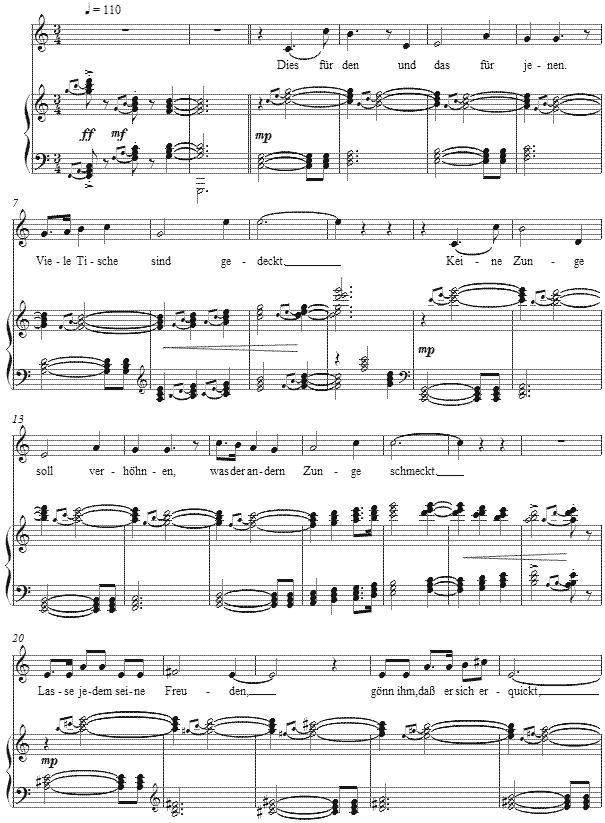Music and Texts of GARY BACHLUND
Vocal Music | Piano | Organ | Chamber Music | Orchestral | Articles and Commentary | Poems and Stories | Miscellany | FAQs
Geschmacksache - (2009)
Wilhelm Busch
for medium voice and piano
Dies für den und das für jenen.
Viele Tische sind gedeckt.
Keine Zunge soll verhöhnen,
Was der andern Zunge schmeckt.
Lasse jedem seine Freuden,
Gönn ihm, daß er sich erquickt,
Wenn er sittsam und bescheiden
Auf den eignen Teller blickt.
Wenn jedoch bei deinem Tisch er
Unverschämt dich neckt und stört,
Dann so gib ihm einen Wischer,
Daß er merkt, was sich gehört.[ 2 pages, circa 1' 20" ]
Wilhelm Busch
This for one and that for another,
Many tables are so varied spread.
No tongue should ever try to smother
Some other tongue's sweet daily bread.
Let each one have some special bent;
Rejoice, when someone takes delight.
When one is happily quite content,
Let's gaze happily at such a sight.
But when someone is at your table
And unabashedly takes a swipe,
Give him something to make him able
To wipe away such unwelcome tripe.
Rhymed paraphrase by the composer
With the surface noise of modern society crying one form of advice towards health -- or another, or yet another, since there is no agreement between them -- this poem is remarkably modern. "Live and let live" is opposed to a noisy, aggressive "do as I say," in so many ways that makes the modern day no more modern than it was centuries ago, and certainly no more modern than when Wilhelm Busch was making such astute observations. [ 1 ]
The recent spate of food advice, from vegan advocates to impassioned politics surrounding labeling of both ingredients and caloric content and further to attempts to ban certain fats, salt and other ingredients from prepared foods, all of these and more evidence inflamed passions today which Busch noted in men in an entire other epoch. For this one will observe the truth that, "plus ça change, plus c'est la même chose." [ 2 ]
This three stanza poem receives a song form setting, in which the center verse is a variation as the accompaniment transposes to the sixth degree of the scale, the vocal line changing its rhythmic periodicity for this stanza, before returning to a reprise of the tonic major and final play-off, noted as accelerando molto al fine.
The score for Geschmacksache is available as a free PDF download, though any major commercial performance or recording of the work is prohibited without prior arrangement with the composer. Click on the graphic below for this piano-vocal score.
NOTES
[ 1 ] Busch, for all his seriousness at times, was like so many other modern commentators, who used humor of to make a most earnest observation of human nature. In one such, found in Reime und Sprüche, he writes: "Oft ist das Denken schwer, indes / das Schreiben geht auch ohne es." That is, "often is thinking so difficult, that writers write on without it." Certainly, the many instances of blatantly falsified reports in newspapers which ended up receiving Pulitzer nominations, as one example among many forms of uncritical thinking, give evidence to Busch's humorous but nonetheless pertinent observation.
[ 2 ] Usually translated in a slight paraphrase rather than a direct translation, "the more things change, the more they stay the same" (Jean-Baptiste Alphonse Karr, in his monthly journal, Les Guêpes, January 1849. Karr was a French critic, journalist who served as editor of Le Figaro, and novelist, whose now famous way of saying this sentiment echoes throughout the ages. Yet it has its antecedent in distant history, as Ecclesiastes 1:9-10 observed, "The thing that was, it is that which will be; and what has happened will happened again: and there is nothing new under the sun. Is there anything of which one might say, Look, this is new? It already has been in another form from before us."
Certainly I write with word processor and a web page creator in making this observation, but while the technology might be "new," that which we do with this technology -- write and read what others have written -- is not new at all. For this, from biblical times to Karr to Busch to today, "live and let live" will be always arrayed against "do as I say."

